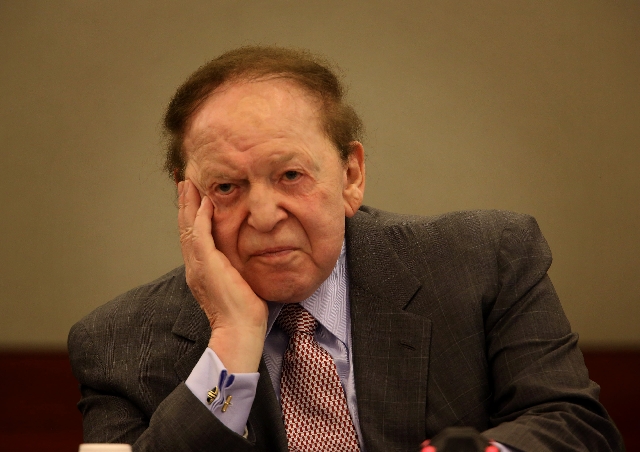Ex-executive’s testimony could shift Adelson trial’s tone

During the 2008 breach-of-contract trial between Hong Kong businessman Richard Suen and Las Vegas Sands Corp., Sheldon Adelson went to great pains to correct his testimony after suggesting that Bill Weidner, who was then president of the company, had breached fiduciary responsibility to the casino operator.
Adelson hasn’t tossed many compliments toward Weidner recently.
On Thursday, as the initial “adverse” witness in the retrial of Suen’s dispute with Las Vegas Sands, Adelson matter-of-factly admitted he fired Weidner in March 2009.
Later in the day, jurors were played a portion of Adelson’s deposition from the still-to-be-tried wrongful termination case filed by former Sands China CEO Gary Jacob.
Jurors heard Adelson say, “Bill turned out to be a liar.”
On Wednesday, they are expected to hear from Weidner himself. That’s when the Suen case could get interesting.
A few Las Vegas Sands insiders thought Weidner’s retrial testimony would mirror the remarks given by Adelson, who spent half of Thursday and all day Friday on the witness stand at the Regional Justice Center answering questions from attorneys.
That now seems highly unlikely.
Even Suen’s legal team is unsure what to expect when they put Weidner on the witness stand.
Weidner has laid low since he left Las Vegas Sands. Last year he resurfaced as the head of a group seeking to build a $2 billion hotel-casino resort in Taiwan.
Last week, a nationally known corporate and financial public relations firm representing Weidner began reaching out to media, figuring his testimony will draw attention.
Suen is seeking $328 million from Las Vegas Sands, claiming his efforts in setting up meetings with key Chinese government officials helped the company earn a Macau gaming foothold in 2002.
A jury in 2008 awarded Suen $43.8 million, but the Nevada Supreme Court overturned the verdict in 2010.
During the 2008 trial, Weidner admitted he proposed and signed a deal with Suen in 2001 in which the businessman was to be paid $5 million plus 2 percent of the company’s Macau gaming revenues.
Last year, Las Vegas Sands’ casinos in Macau produced almost $6.5 billion of the company’s $11.13 billion in total revenues.
Weidner spent parts of six days on the witness stand in the first Suen trial. He admitted signing the deal, but told jurors he didn’t believe Suen deserved any payment.
There is much anticipation about what he will say this week.
This time, Adelson’s time on the witness stand created a circuslike atmosphere. At times, the 79-year-old billionaire channeled forgetful Uncle Leo of “Seinfeld,” not remembering key events or dates. Adelson had to count on his fingers how many casinos Las Vegas Sands owns.
“What you’re asking me happened 13 years ago,” Adelson told Suen attorney John O’Malley.
Earlier, Suen attorney Jim Pisanelli accused Adelson of “attempting to take over this courtroom” after the gaming executive flashed unapproved evidence for the jury.
On one point, however, Adelson’s memory was crystal clear. He said Suen didn’t deliver a Macau license and was not of any help to the company.
“He wanted to keep his hand in the pie,” Adelson said.
Adelson admitted that Las Vegas Sands doesn’t even have a Macau gaming license. The company operates its casinos under a subconcession owned by Hong Kong-based Galaxy Entertainment. The relationship was put together by Macau’s government after Las Vegas Sands wasn’t awarded one of three concessions in 2002.
Adelson claimed Macau wanted Las Vegas Sands not because of Suen’s contacts but because of the company’s experience in creating convention and meeting business.
“I’m not trying to misrepresent or razzle-dazzle you,” Adelson said. “The government wanted our expertise.”
Adelson’s appearance in a courtroom was billed as the main attraction. He is now No. 12 on the Forbes 400 list of richest Americans, with a net worth of $26.5 billion, and last year gave more than $100 million to Republican political candidates.
When the Nevada Supreme Court vacated the original verdict, legal sources speculated that justices were hinting the two sides should settle.
Compromise is not in Adelson’s vocabulary.
Weidner’s appearance on center stage could, however, weigh on the jury.
His relationship with Adelson soured in late 2008 when dry credit markets and the sagging economy forced Las Vegas Sands to restructure its debt to avoid bankruptcy. Adelson put more than $1 billion into the company as part of the $2.1 billion recapitalization, reducing his ownership stake by almost 20 percent.
In the months before his departure, Weidner characterized internal bickering between him and Adelson “as a junkyard-dog fight.”
The first Suen trial might have been the stepping-off point.
Adelson initially testified that Weidner breached fiduciary responsibilities when the company president told Suen to find investors to help obtain the Macau license.
Weidner had a meltdown over the comments. Las Vegas Sands attorneys put Adelson back on the witness stand that day to clarify the testimony.
The damage, however, was done.
Las Vegas Sands does have one card to play that it didn’t in 2008.
The company plans to introduce William McCahill Jr. as a witness. A 25-year career diplomat, McCahill was the chargé d’affaires at the U.S. Embassy in Beijing. He is expected to blow holes in Suen’s claim that mainland China influenced the Macau licensing process.
Weidner and McCahill won’t be a sideshow.
Howard Stutz’s Inside Gaming column appears Sundays. He can be reached at hstutz@reviewjournal.com or 702-477-3871.
Follow @howardstutz on Twitter.












